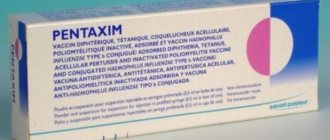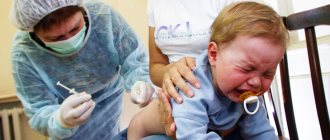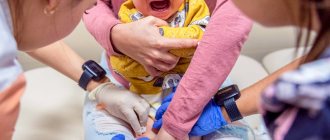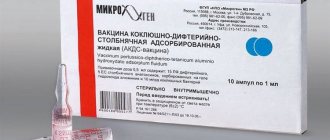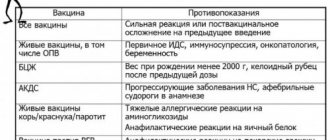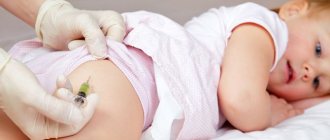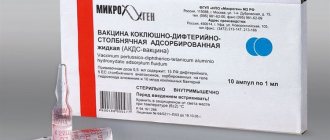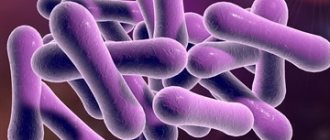Vaccination is an effective preventive measure that allows people to protect themselves from various types of infections and avoid serious diseases, including influenza. However, vaccination does not pass without a trace: it can cause some side effects. Knowing what not to do after getting a flu shot will help a person minimize the damage to their own health.
- First instructions
- The impact of vaccination on well-being
- List of prohibitions
- Alcohol
- Nutrition
- Communication with the outside world
- Bathing
- Medicines
- When the temperature rises
- Conclusion
First instructions
It is not recommended to leave the hospital or health center immediately after vaccination. Each individual body responds to the vaccine in its own way, and the first 20-30 minutes are allocated for adaptation. It is better to wait this time in the hospital (or on its territory) so that in the event of an unexpected reaction, the medical staff can provide assistance to the patient.
Please note : if a person previously tolerated vaccination easily, without complications, then adaptation is not necessary. However, children and people with chronic diseases need it.
The impact of vaccination on well-being
When a weakened or killed virus enters the human body, it causes a response. Sometimes it can be immediate, but more often it appears only after a few hours.
Please note : statistics have recorded that in Russia, after vaccination, 1% of people experience general side effects, and 4% experience local side effects.
The main manifestations of the reaction to the influenza virus:
- increase in body temperature to 37.5⁰С;
- chills, feeling of coldness in the hands and feet;
- general weakness;
- fast fatiguability;
- poor appetite;
- sweating;
- poor sleep or insomnia.
At the injection site you may experience:
- redness;
- itching, rash (signs of possible allergies);
- inflammation;
- slight swelling;
- compaction;
- painful sensations.
These symptoms are confirmation that a person has developed immunity to the flu. As a rule, the response to the vaccine lasts no more than a day and occurs without serious complications.
Please note : the children's body is more susceptible to the action of irritants, and therefore the listed symptoms appear more often (and more clearly) in children.
What's happened
In Russia, flu vaccination started on September 1. On behalf of Vladimir Putin, this year it is planned to vaccinate 60% of the population using the federal budget, covering up to 75% of patients from risk groups. According to the head of Rospotrebnadzor Anna Popova, in the current epidemiological season, strains of the influenza virus will be widespread, “for which Russians have not yet been vaccinated.”
This year, according to the World Health Organization (WHO), the influenza virus and COVID-19 are expected to circulate simultaneously. Due to the fact that the influenza virus changes genetically, WHO regularly updates recommendations on the composition of the vaccine for both hemispheres of the Earth. For the 2020/21 season, the organization recommends quadrivalent vaccines containing four different strains of the virus in the Northern Hemisphere. The head of Rospotrebnadzor previously stated that the Russian vaccine has also been updated and contains three new strains.
If you can get vaccinated with the Russian vaccine free of charge in public medical institutions, then the foreign-made flu vaccine is available only in private clinics. RBC surveyed leading clinics and found out that Russians will not be able to receive a foreign flu vaccine before mid-October.
List of prohibitions
Vaccination forces a person to change their lifestyle for several days and abstain from many usual things.
It is not recommended for anyone who has been vaccinated against the flu:
Visit a bathhouse or sauna, dive into an ice hole.
Sudden temperature changes, hypothermia and overheating are perceived by the body as a strong stress factor. Therefore, any water procedures other than standard swimming are strictly prohibited. Trips to water aerobics or the swimming section will also have to be postponed for a couple of days.
Swim in open waters.
Water in a river, pond or lake contains many pathogens that can enter through a fresh wound - the injection site. The development of inflammatory processes is ensured in 70% of cases.
Be in a crowd.
Large crowds of people are dangerous for the vaccinated person because each individual person is a potential source of the disease. In the post-vaccination period, the immune system tries to overcome the virus introduced with the vaccine, and therefore loses the ability to fight other pathogens. At this time, encountering disease carriers can negatively affect the patient's health.
Host/attend parties.
In addition to the large number of people at parties, there is another danger - the temptation to drink. As practice shows, not everyone manages to overcome this desire.
Try exotic dishes and get acquainted with new cuisine.
It is unknown how the digestive system will react to new unusual dishes - intoxication, allergies. Therefore, during a period of vulnerability, it is better to refrain from culinary experiments.
Play sports and be active physically.
A strong load on the body quickly exhausts you. Fatigue is followed by a deterioration in well-being, even short-term fainting is possible. Sports competitions, training, general cleaning, washing (by hand) - all these events must be postponed. It is better for a person to remain calm for 2-4 days.
Leave the city.
Flu symptoms can appear suddenly without help available. The effects of vaccination are most easily tolerated in a quiet, calm home environment. In the city it is possible to visit a doctor in case of unexpected complications. Therefore, it is better to stay at home for a couple of days after vaccination.
Compliance with all of the above recommendations will minimize the risk of getting sick.
Also, within 10 days after vaccination, a person is prohibited from donating blood as a donor. The virus introduced with the vaccine remains in the patient’s blood. People who need blood transfusions are physically weak. The entry of the virus into their vulnerable body will provoke the development of the disease and can lead to death.
Blood tests taken during the post-vaccination period will show a false result.
Alcohol
Adults who have been vaccinated against influenza are wondering whether they can drink alcohol after vaccination. Doctors respond with a strict ban, and there are several logical explanations for this:
- During the post-vaccination period, a person should remain in a calm state. Physical or nervous overexcitation caused by alcohol is contraindicated - this factor reduces the effectiveness of the vaccine by almost half.
- One of the side effects of the flu shot is weakness. Alcohol will only worsen a person’s physical condition: increased dizziness, a feeling of “breaking” bones, and muscle pain.
- Drinking alcohol increases the risk of developing the disease. Alcohol weakens the immune system, so the body will not be able to fight the virus received with the vaccine. Influenza infection will occur.
Thus, alcohol increases the patient’s painful condition, and also negates all prevention.
Immunologists advise refraining from drinking alcohol for three days after vaccination. After vaccination, you should not drink “weak” alcoholic drinks, energy drinks, non-alcoholic beer and kvass - they also reduce the effectiveness of vaccination.
Nutrition
Vaccination often entails dysfunction of the gastrointestinal tract, and therefore it is better not to overload it for 3-4 days.
After the vaccine is administered, it is recommended to abstain from eating for an hour. For the next couple of days, you should exclude fatty, heavy foods, empty carbohydrates (sweets, chips), soda, and coffee from your diet.
Meat takes a long time to digest and creates a feeling of congestion in the stomach, so it is better to give preference to vegetables and fruits, cereals, and broth. Fried foods can be replaced with steamed ones.
Abuse of unhealthy foods and overeating are common causes of nausea, stomach pain, and upset.
During the rehabilitation period you need to drink a lot of water.
Communication with the outside world
As already mentioned, active rest after vaccination can lead to unpleasant consequences.
In the next 2-3 days, doctors recommend going for walks in a green area (park, square). This environment is good for health, while minimizing contact with other people.
After vaccination, it doesn’t hurt to take a day off to allow your body to recover. Vaccination suppresses both physical and brain activity, so a person’s performance these days also decreases.
Which vaccine is more effective against influenza?
The therapeutic effect of Grippol plus and Sovigrippa is no different.
According to the opinion of many doctors, most are inclined to choose Sovigrippa. This is due to the wide range of therapeutic effects and few side effects.
Laboratory studies confirm the full compliance of vaccines with medical requirements.
The therapeutic duration of the products does not differ. Antiviral activity is noted 2-3 days after vaccination. The protective properties of pharmaceuticals last up to 6-12 months.
Bathing
Some doctors allow patients to shower on the day of vaccination, as long as they do not rub the injection site with a washcloth. However, when it comes to a small child, it is better to avoid getting water on his wound. The baby can be dried with a towel dipped in warm water. In one evening the wound will heal, and the next day swimming will not pose any danger.
Medicines
Taking some medications after getting a flu shot can be harmful to a person's health.
Ideally, only healthy people should be vaccinated. Colds, malaise, fever and exacerbation of chronic diseases are contraindications to vaccination. However, there are situations when taking medications is necessary.
This applies to antihistamines. After vaccination, children and adults are not recommended to drink Suprastin and Tavegil. These drugs deactivate the production of mucus in the respiratory tract. As a result, the protective function of the bronchi is disrupted, and the main factor that prevents the penetration of allergens and pathogens inside disappears. Under such conditions, the risk of getting sick increases several times.
Therefore, it is better to replace Suprastin with Zyrtec and Fenistil.
It is also necessary to avoid taking vitamin D in the next 5 days after vaccination. This is due to the fact that vitamin D provokes calcium imbalance and greater sensitivity to allergens.
Vaccination rules
The drugs Sovigripp and Grippol plus are used at the same time. Traditionally, vaccination is carried out in the off-season, when the risks of epidemic activity increase.
The drug is used for parenteral administration. The main injection sites are the muscles of the thigh, shoulder and, less commonly, the buttock.
The dosage depends on age:
- From 6 months to 3 years - 0.25 ml twice with a break of 4 weeks, if vaccination is carried out for the first time. Previously vaccinated children receive a single injection with a dosage of 0.5 ml.
- Children over 3 years old and adults - 0.5 ml 1 time.
- Persons with immunodeficiency - 0.5 ml 2 times with an interval of 4 weeks.
When the temperature rises
One of the common phenomena of the post-vaccination period is an increase in body temperature - this indicates activation of the immune system. Almost every vaccinated child faces this problem. What should parents do in this case? The instructions are:
If the thermometer readings do not reach 38⁰C.
There is no need to resort to the help of traditional or traditional medicine and bring down the temperature. In this case, antipyretics can harm the child’s body.
If the temperature is above 38⁰C.
It is necessary to give the child Paracetamol or Ibuprofen. Parents should remember that Aspirin irritates the gastrointestinal tract and creates a burden on the child’s fragile digestive system. Therefore, this antipyretic drug is contraindicated after vaccination.
Young, inexperienced parents make the mistake of wrapping their child in warm clothes and a blanket when the temperature rises. This should not be done, as the baby is at risk of overheating.
It is better to leave light clothing on the child or completely undress him and cover him with a thin sheet.
Please note : if the temperature persists for 2-3 days, this is a good reason to call a doctor.
As it was before
The lack of foreign vaccines during the epidemiological season is an annual problem. In 2021, according to Vedomosti, Vaxigripp produced by Sanofi Pasteur was delivered only by the end of September, while Influvac was not delivered at all. In 2021, according to Rossiyskaya Gazeta, at the beginning of October it was impossible to be vaccinated with a foreign vaccine in Russia.
Sanofi told RBC that in 2021 they plan to continue supplying the vaccine to prevent influenza. “The vaccine will arrive in the country to further undergo the procedure for introducing it into civilian circulation and no earlier than in October, it will be available for shipment from the warehouse of Sanofi Russia JSC. The vaccine will be available through the traditional distribution network,” Yuri Mochalin, director of corporate relations at Sanofi in the Eurasian region, explained to RBC.
Abbott did not respond to RBC’s request about whether it plans to supply the Influvac vaccine to Russia.
